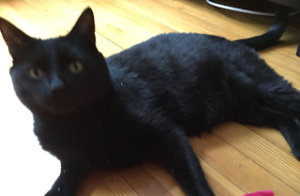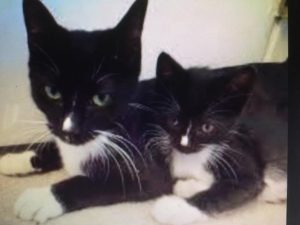12 Jul Feral Cat A Home-Saver For An Aggressive Cat
Feral Cats — Home-Saver For Many A Cat

Ziggy-Star-Dust my first feral cat
Feral cats will always play a major role in my life and practice. I’m so very grateful for the relationship I had with Ziggy- Star-Dust. He was a feral black kitten whom I adopted the night of a post-concert party for David Bowie. It was a beautiful and inspiring seventeen years. One of my tributes to Star-Dust was a star in his name. This was arranged through the International Star Registry. He will always shine brightly.
Unpredictably Aggressive

Bear, unpredictable and aggressive until Betsy moved in
I’m reminded of Betsy, a feral kitten, who was matched with Bear, a young aggressive cat. Bear’s guardian, Jim, had adopted him from a shelter as an adolescent of eight months. He was a neutered cat that had been adopted once before but returned. Jim sought my help because Bear was unpredictable. Although usually very endearing, sometimes Bear would suddenly stalk and nip. Jim was about to adopt an infant baby boy and was afraid for the baby.
The Single Cat Syndrome
I told Jim that Bear’s aggressive behavior was symptomatic of the single cat syndrome. If Bear had the right feline companion, he would be able to use up this high energy in play with the kitten. No longer would he be frustrated. His aggressive edge with people would disappear because his high energy would be released in his interactions with the kitten. No longer would Bear be the Bad Boy
Home-Saver Companion

Bear took to Betsy
I explained that a young kitten who was cat-oriented but tolerated human contact would be a good match. Another choice would be a feral kitten or young cat who only had eyes for cats and ignored people. Gender was not an issue. Jim decided that he would prefer a feral because such a cat would keep a low or no profile with the baby. I was able to locate, Betsy, an adolescent, spayed female whom Bear quickly accepted. He loved having a companion who couldnít get enough of him. Jim was very pleased that Bear would have a permanent diversion and distraction when the baby arrived. He also realized that his responsibility with fulfilling Bear’s needs and not, thoughtlessly, returning him to the shelter, would help him with his understanding of the baby.
……..



